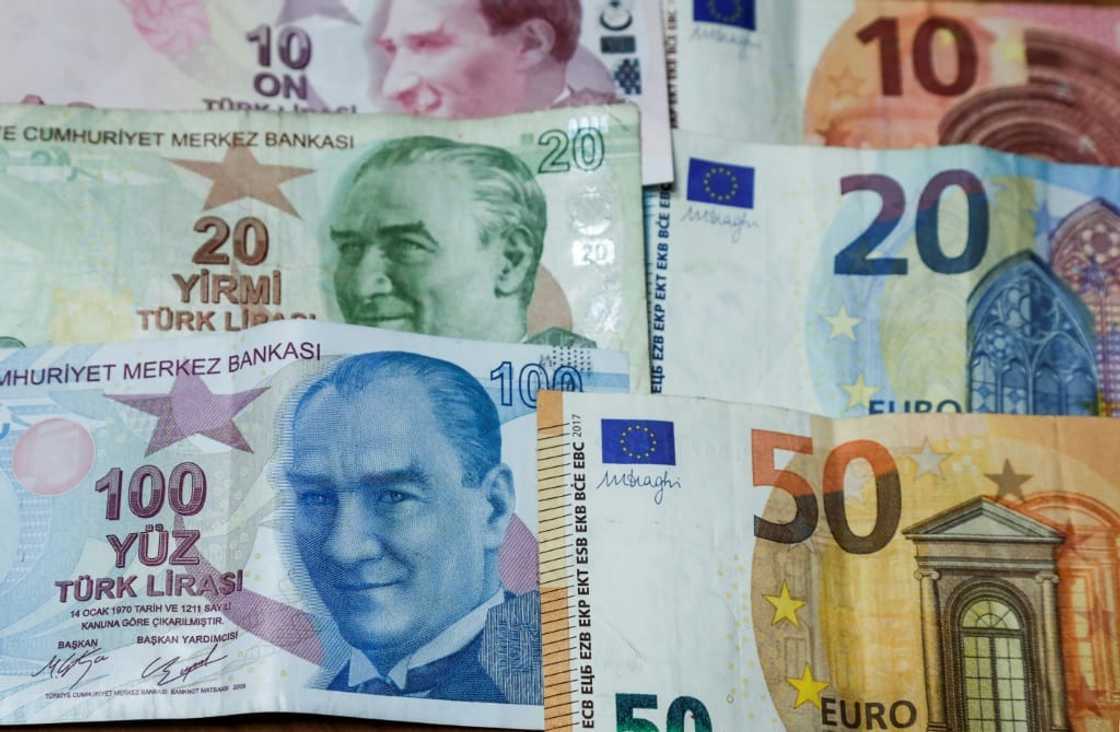Turkey's troubled lira rallies on 'backdoor capital controls'

Source: AFP
PAY ATTENTION: Follow Briefly News on Twitter and never miss the hottest topics! Find us at @brieflyza!
Turkey's beleaguered lira extended its biggest rally of the year on Monday in response to a new rule that effectively forces many banks to part with some of their foreign currency.
The banking regulation -- announced after the market had closed on Friday night -- represents Turkey's latest attempt to prop up the lira without raising the main interest rate.
President Recep Tayyip Erdogan's pressure on the central bank to keep borrowing costs well bellow the rate of inflation has sparked an economic crisis that has seen the lira slump and prices explode.
Erdogan rejects conventional economics and affirms that high interest rates cause inflation instead of slowing it down.
The annual rate of consumer price increases now officially stands at 73.5 percent. Independent economists believe it could be nearly double that figure.
The dollar dropped to 16.1 liras early Monday before recovering slightly and trading around the 16.7 mark.
PAY ATTENTION: Follow us on Instagram - get the most important news directly in your favourite app!
The US currency was worth around 17.4 liras before the measure was announced. It stood at 7.4 liras at the start of last year and 5.9 liras in January 2020.
Turkey's real interest rate of minus 59.5 percent provides a major incentive for consumers to spend money before it loses value and for banks to convert their holdings into dollars and euros.
The new rule attempts to put a stop to that by limiting banks' foreign-denominated assets.
It requires banks with more than 15 million liras ($900,000) in foreign currency -- should that figure represents more than 10 percent of their assets or annual sales -- to sell their dollars and euros before issuing any more loans.
The measure meant that some big banks whose lira loans matured Monday had to sell their foreign currencies in order to make the payments.
BlueBay Asset Management economist Timothy Ash called the regulation "backdoor capital controls".
The banking regulator clarified Sunday that the measure did not apply to individuals or independent entrepreneurs.
'Liraisation'
Erdogan's economic team has ruled out imposing strict currency control and is espousing its allegiance to the markets.
The head of Turkey's MUSIAD big business association also welcomed the measure -- seen by economists as another step in Erdogan's push for the "liraisation" of the emerging market's economy.
The new rule will "prevent dollarisation, which is the main factor behind the rise in the exchange rate," MUSIAD chief Mahmut Asmali told reporters.
But OMG Capital Advisors consultancy head Murat Gulkan said the measure could have a damaging long-term effect on Turkey's business climate.
The new rules will "complicate the operating conditions of banks and companies," Gulkan said.
"The cornerstone of the system is the policy rate of the central bank. When that cornerstone is misplaced, it is necessary to take extraordinary steps like this latest decision."
Ash agreed that the measure "over-complicates things for business and banks when what everyone knows Turkey needs is plain and simple interest rate increases".
PAY ATTENTION: check out news exactly for YOU ➡️ find "Recommended for you" block and enjoy!
Source: AFP

